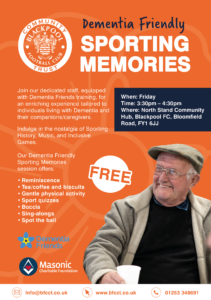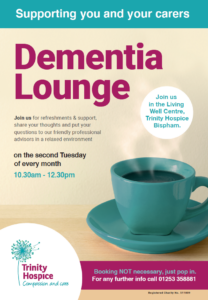Dementia Support
Dementia is an umbrella term for a range of progressive conditions that affect the brain, it can affect a person at any age but it’s more common in people over the age of 65.
Dementia is not a normal part of ageing and it is not just about forgetting things. It is a group of symptoms caused by different diseases that damage the brain. The symptoms get worse over time and include:
- memory loss
- confusion and needing help with daily tasks
- problems with language and understanding
- changes in behaviour
The Alzheimer's Society has produced a symptoms checklist endorsed by the Royal College of GPs, to support people to get a vital diagnosis, please take a look here:- symptoms checklist
One in three people born in the UK today will develop dementia in their lifetime. A report in 2024, commissioned by the Alzheimer’s Society, shows that around a million people in the UK have a form of dementia. This is projected to rise to 1.4 million people by 2040. Almost all of us will know someone living with the condition.
Some people may be more likely to develop dementia than others, like those who have had a stroke, or who have:
- Diabetes
- High blood pressure
- High cholesterol
- Depression
It is very important for anyone who has regular problems with their memory or thinking to be assessed by a health professional. If these problems are because of dementia, getting an early diagnosis has many benefits. It gives the person an explanation for their symptoms, gives them access to treatment, advice and support, and allows them to plan for the future.
Here is a video made in Blackpool during Dementia Action Week by Alzheimers UK
https://www.youtube.com/watch?v=Q7LITRW-iA4
If you are concerned about the memory of a loved one or friend then you may well be looking at this page to learn more and seek out how to get some help. In the links are details of local support groups and other services.
Local support Groups/Dementia Cafes and Lounges
There are several Dementia friendly support groups across Blackpool, helping to ensure that people with dementia and their carers who may be feeling confused, isolated or lonely, or just want to meet people, know where they can go for support. They are a great way for people affected to meet up, have a coffee and feel connected.
Fylde-Coast-Dementia-Local Support-updated-July-2024.pdf (trinityhospice.co.uk)
Useful Links:-
- Blackpool Carers Centre https://blackpoolcarers.org/
- What is Dementia NHS UK http://www.nhs.uk/Conditions/dementia-guide/Pages/about-dementia.aspx
- Looking after Someone with Dementia NHS UK http://www.nhs.uk/Conditions/dementia-guide/Pages/dementia-carers.aspx
- Dementia UK http://www.dementiauk.org/
- Alzheimer’s Society https://www.alzheimers.org.uk/
- The Herbert Protocol used by Lancs Police LANCASHIRE POLICE - Lancashire Constabulary
- Diagnosing Dementia NHS UK Tests for diagnosing dementia - NHS
Dementia Support groups
- The “Dementia Lounge” on the second Tuesday of every month 10:30am -12:30pm at the Living Well Centre, Trinity Hospice, Bispham.
- The “Dementia Friendly Sporting Memories” group meet each Friday 3:30pm -4:30pm at North Stadium Community Hub, Blackpool Football Club, Bloomfield Road.


Please click on the link to learn more about dementia Home - Dementia UK
Further Support
Dementia Friend
The Alzheimer's Society runs a scheme called Dementia Friends.
A Dementia Friend learns a little bit more about what it's like to live with dementia and then turns that understanding into action - anyone of any age can be a Dementia Friend. From helping someone to find the right bus to spreading the word about dementia on social media, every action counts.
If you are interested in becoming a Dementia friend or for more information, click here More information on Dementia Friends
Dementia books on prescription
Reading Well Books on Prescription helps people understand and manage their health and wellbeing using self-help reading. The scheme is endorsed by health professionals and supported by public libraries.
The books have been developed with dementia healthcare experts, people with dementia and carer groups to select a list of 25 titles that provide support and advice for people with dementia and their carers. Health professionals will be able to use the list to prescribe books to their patients and the titles will be available for anyone to borrow free-of-charge from their public library
The Dementia Books on Prescription can be found in all eight Blackpool libraries.
